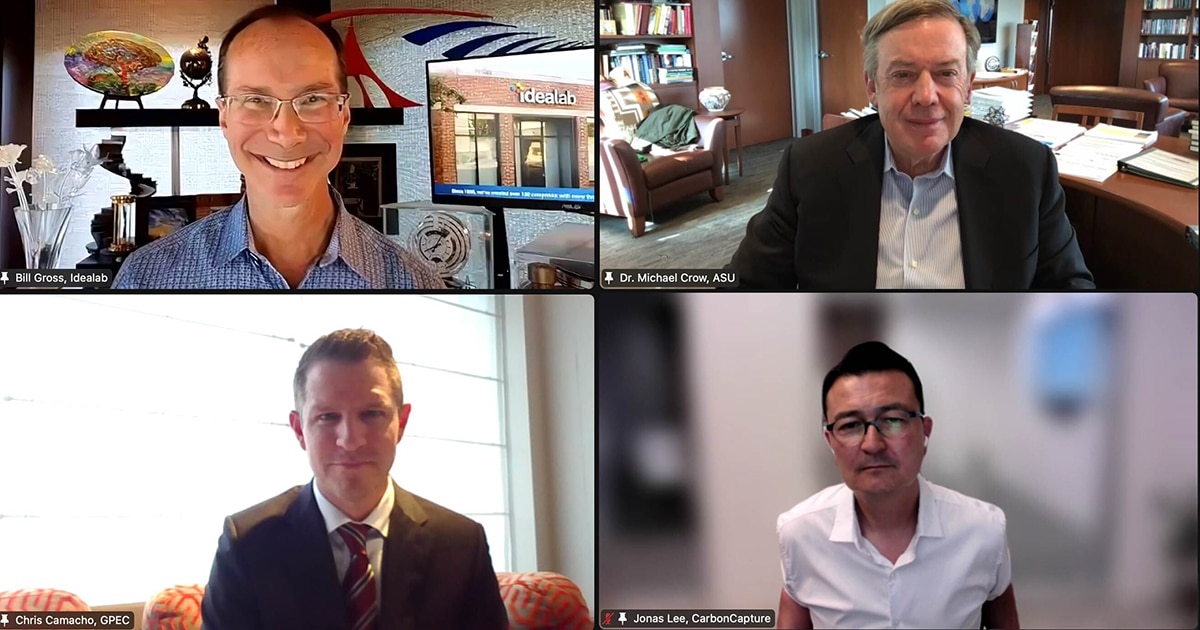

Special Event: The New Photon Economy
Published: 08/29/2023
How Greater Phoenix can become the country’s next climate tech hub
Advancements in technology have opened the door to the future of energy — and Greater Phoenix is on the doorstep.
Local sustainability leaders and clean energy innovators joined the Greater Phoenix Economic Council (GPEC) to introduce the concept of The New Photon Economy, a vision for turning Arizona into the leading climate tech hub in the U.S. by using the region’s abundant natural elements to replace energy acquired from fossil fuels. The panel consisted of:
- Michael Crow, President, Arizona State University (ASU)
- Bill Gross, Founding Chairman & CEO, Idealab
- Jonas Lee, Chief Commercial Officer, CarbonCapture Inc. (CarbonCapture)
- Moderator: Chris Camacho, President & CEO, Greater Phoenix Economic Council
“What an incredible chance for us to be great. Globally great,” Camacho said. “You want to be able to build something that hasn’t existed.”
What is The New Photon Economy?
The new photon economy centers on developing technologies to produce clean energy from carbon, hydrogen and solar in place of current systems using fossil fuels like coal. By harnessing natural and photonic elements, humans can maintain energy usage cleanly.
“There is, for the first time in our history, an opportunity to build an industrial foundation around the way that nature works as opposed to heating and beating and bending everything,” Crow said. “A whole new way to think about how to manage our relationship with the planet — but more important than that, how to use the assets of planet … how to use nature and all of its power and all of its elegance and all of its glory to build economic opportunity for us.”
This is the next stage of energy evolution. For the majority of human history, energy was based on the manual labor of people. With the development of modern electricity, energy shifted from biology to chemistry. Gross said that energizing the world through protons will be the next stage — one based on physics.
“We’ve been through the industrial revolution. We’ve been through an amazing computer revolution. But this new photon economy revolution is going to dwarf both of those,” Gross said. “This is powering the entire planet. This is how all of the energy will be provided in the future.”
How new energy can help companies
To meet the goals outlined in the Paris Agreement, the Intergovernmental Panel on Climate Change outlined the need to remove 5 to 10 billion tons of CO2 from the air annually by 2050.
CarbonCapture, created at IdeaLab Studio, develops and deploys direct air capture (DAC) machines that remove CO2 from the atmosphere and is a leading innovator in this endeavor. The company has recently reached agreements with companies including Microsoft and Boston Consulting Group that are seeking to purchase carbon removal credits to offset emissions.
Many companies have set goals to achieve net-zero carbon by 2030 or 2035. The Inflation Reduction Act (IRA) will play a role in the completion of these goals, including financial incentives for costs associated with low-carbon or net-zero energy projects. The IRA also increased the funding paid out by the 45Q tax credit, as companies like CarbonCapture can now receive up to $180 per ton of CO2.
“There are not too many times there is both an economic opportunity to build a new industry this size but to do it and feel good about what you’re doing, because you’re doing something good for the planet,” Lee said.
Why Arizona is positioned to lead The New Photon Economy
Arizona and Greater Phoenix have attributes that help any clean tech startup including education — ASU is the No. 1 school for sustainability and No. 2 globally for the UN Sustainable Development Goals — and a large existing workforce. The sunny environment with few natural disasters limits potential downtime. Idealab, which has started more than 150 companies and had more than 50 IPOs, lays down a foundation for dedicated future growth.
Existing collaborations also give Greater Phoenix a head start. ASU and CarbonCapture are partnering on the first commercial DAC system in the U.S. and are working to build a DAC module manufacturing center. The ASU-led Southwest Regional Direct Air Capture Hub was recently selected for a DAC hub award by the U.S. Department of Energy (DOE), with total funding over $23 million and the potential for an additional $600 million in non-dilutive equity funding, Lee said.
“We’re hopeful that other companies recognize what we’re recognizing in Phoenix in terms of not just that there’s good energy here, but there’s also a business-friendly climate looking to get things done,” Lee said.
Further developing technology and the clean energy industry could show revolutionary benefits to Greater Phoenix — not only will there be direct economic benefits for companies and employees in the region, but the Bipartisan Infrastructure Deal (BIL) allocated $3.5 billion to fund four regional DAC hubs. Arizona can become an epicenter for clean energy.
“We have spent, we have risked, make no mistake about it, billions of dollars hiring people, building facilities, building laboratories, building equipment, building advanced learning systems to make this happen,” Crow said. “The underpinning of knowledge creation, technology support, learning support and educational support is now in place for a new photon-driven economy here in Arizona.”
Meet the Panel
Michael Crow
President
Arizona State University (ASU)
Bill Gross
Founding Chairman & CEO
Idealab
Jonas Lee
Chief Commercial Officer
CarbonCapture Inc.
Chris Camacho
President & CEO
Greater Phoenix Economic Council



